Individual Report: Contract Law Analysis of Two Case Scenarios
VerifiedAdded on 2023/06/18
|8
|2105
|210
Report
AI Summary
This individual report delves into the intricacies of contract law by analyzing two distinct case scenarios. The first scenario examines the formation of a contract, focusing on offer, acceptance, and the revocation of an offer, as well as the concept of lapse of time. It explores the rights and responsibilities of parties involved in a contract, emphasizing the absence of a binding agreement. The second scenario investigates the principle-agent relationship, specifically focusing on the contractual obligations and the remedies available to the aggrieved party when a contract is breached, including damages and specific performance. The report highlights the importance of valid contracts, the essential elements required for their formation, and the legal consequences of non-performance, referencing relevant case law and providing a comprehensive overview of contract law principles.

Individual Report
Paraphrase This Document
Need a fresh take? Get an instant paraphrase of this document with our AI Paraphraser
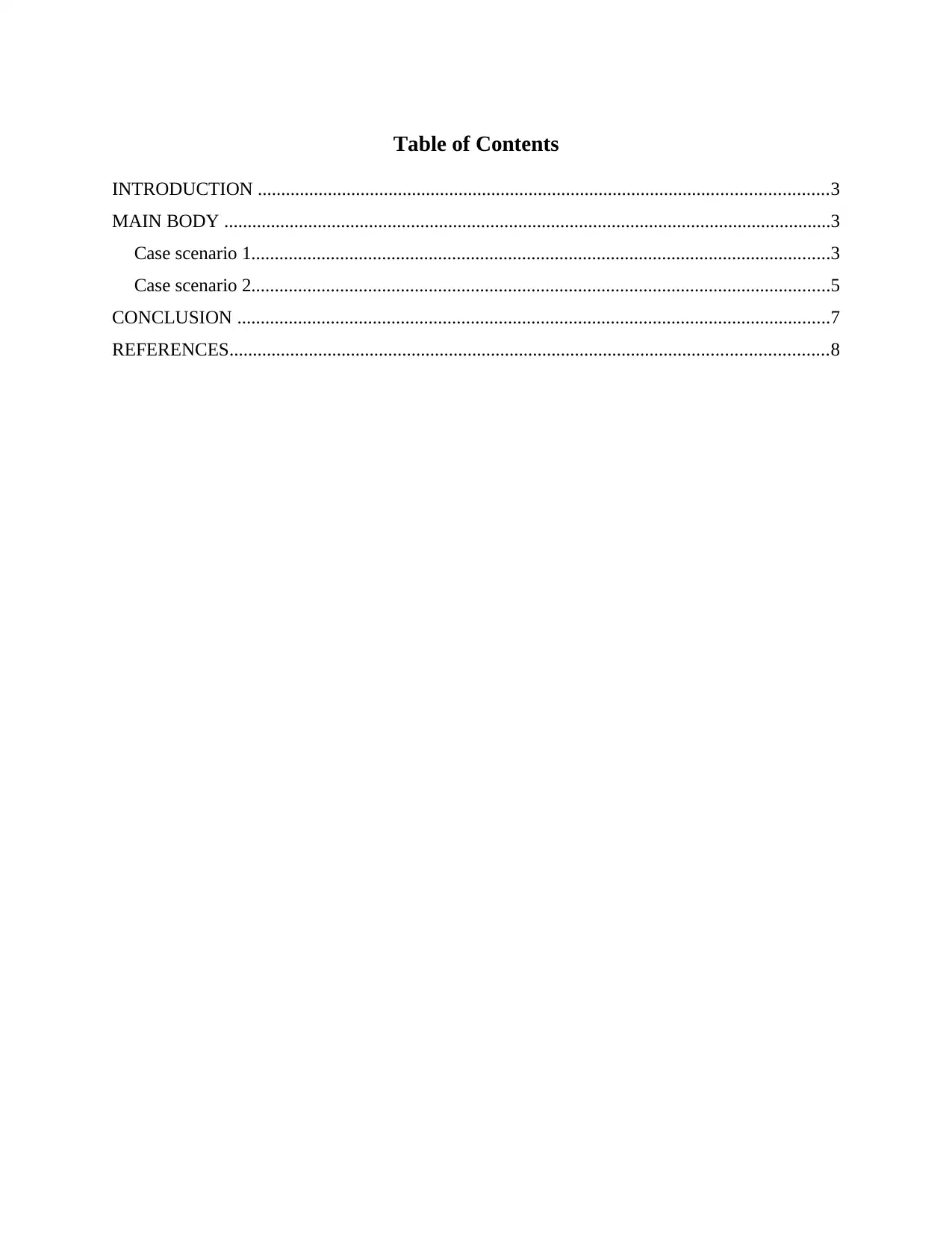
Table of Contents
INTRODUCTION ..........................................................................................................................3
MAIN BODY ..................................................................................................................................3
Case scenario 1............................................................................................................................3
Case scenario 2............................................................................................................................5
CONCLUSION ...............................................................................................................................7
REFERENCES................................................................................................................................8
INTRODUCTION ..........................................................................................................................3
MAIN BODY ..................................................................................................................................3
Case scenario 1............................................................................................................................3
Case scenario 2............................................................................................................................5
CONCLUSION ...............................................................................................................................7
REFERENCES................................................................................................................................8
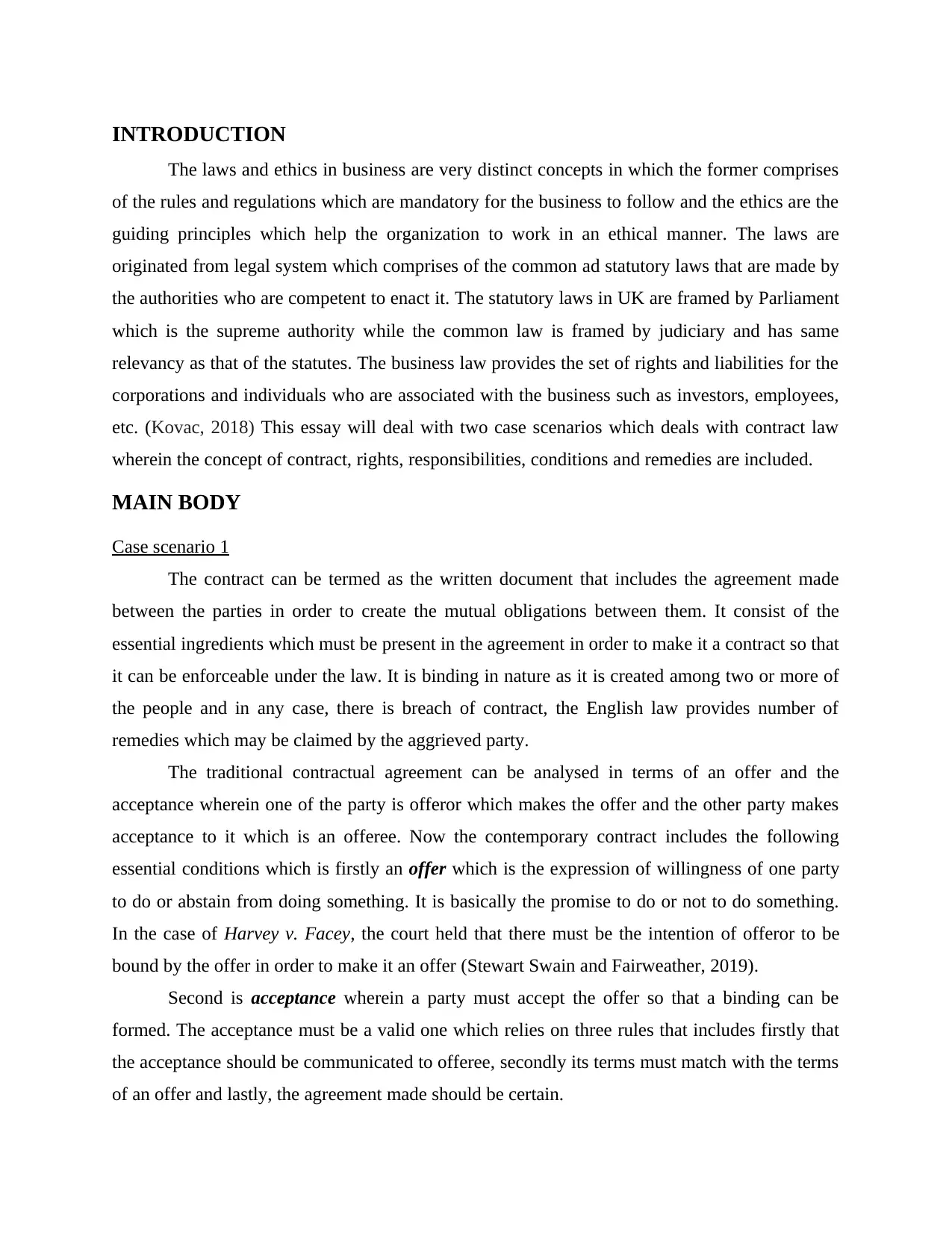
INTRODUCTION
The laws and ethics in business are very distinct concepts in which the former comprises
of the rules and regulations which are mandatory for the business to follow and the ethics are the
guiding principles which help the organization to work in an ethical manner. The laws are
originated from legal system which comprises of the common ad statutory laws that are made by
the authorities who are competent to enact it. The statutory laws in UK are framed by Parliament
which is the supreme authority while the common law is framed by judiciary and has same
relevancy as that of the statutes. The business law provides the set of rights and liabilities for the
corporations and individuals who are associated with the business such as investors, employees,
etc. (Kovac, 2018) This essay will deal with two case scenarios which deals with contract law
wherein the concept of contract, rights, responsibilities, conditions and remedies are included.
MAIN BODY
Case scenario 1
The contract can be termed as the written document that includes the agreement made
between the parties in order to create the mutual obligations between them. It consist of the
essential ingredients which must be present in the agreement in order to make it a contract so that
it can be enforceable under the law. It is binding in nature as it is created among two or more of
the people and in any case, there is breach of contract, the English law provides number of
remedies which may be claimed by the aggrieved party.
The traditional contractual agreement can be analysed in terms of an offer and the
acceptance wherein one of the party is offeror which makes the offer and the other party makes
acceptance to it which is an offeree. Now the contemporary contract includes the following
essential conditions which is firstly an offer which is the expression of willingness of one party
to do or abstain from doing something. It is basically the promise to do or not to do something.
In the case of Harvey v. Facey, the court held that there must be the intention of offeror to be
bound by the offer in order to make it an offer (Stewart Swain and Fairweather, 2019).
Second is acceptance wherein a party must accept the offer so that a binding can be
formed. The acceptance must be a valid one which relies on three rules that includes firstly that
the acceptance should be communicated to offeree, secondly its terms must match with the terms
of an offer and lastly, the agreement made should be certain.
The laws and ethics in business are very distinct concepts in which the former comprises
of the rules and regulations which are mandatory for the business to follow and the ethics are the
guiding principles which help the organization to work in an ethical manner. The laws are
originated from legal system which comprises of the common ad statutory laws that are made by
the authorities who are competent to enact it. The statutory laws in UK are framed by Parliament
which is the supreme authority while the common law is framed by judiciary and has same
relevancy as that of the statutes. The business law provides the set of rights and liabilities for the
corporations and individuals who are associated with the business such as investors, employees,
etc. (Kovac, 2018) This essay will deal with two case scenarios which deals with contract law
wherein the concept of contract, rights, responsibilities, conditions and remedies are included.
MAIN BODY
Case scenario 1
The contract can be termed as the written document that includes the agreement made
between the parties in order to create the mutual obligations between them. It consist of the
essential ingredients which must be present in the agreement in order to make it a contract so that
it can be enforceable under the law. It is binding in nature as it is created among two or more of
the people and in any case, there is breach of contract, the English law provides number of
remedies which may be claimed by the aggrieved party.
The traditional contractual agreement can be analysed in terms of an offer and the
acceptance wherein one of the party is offeror which makes the offer and the other party makes
acceptance to it which is an offeree. Now the contemporary contract includes the following
essential conditions which is firstly an offer which is the expression of willingness of one party
to do or abstain from doing something. It is basically the promise to do or not to do something.
In the case of Harvey v. Facey, the court held that there must be the intention of offeror to be
bound by the offer in order to make it an offer (Stewart Swain and Fairweather, 2019).
Second is acceptance wherein a party must accept the offer so that a binding can be
formed. The acceptance must be a valid one which relies on three rules that includes firstly that
the acceptance should be communicated to offeree, secondly its terms must match with the terms
of an offer and lastly, the agreement made should be certain.
⊘ This is a preview!⊘
Do you want full access?
Subscribe today to unlock all pages.

Trusted by 1+ million students worldwide
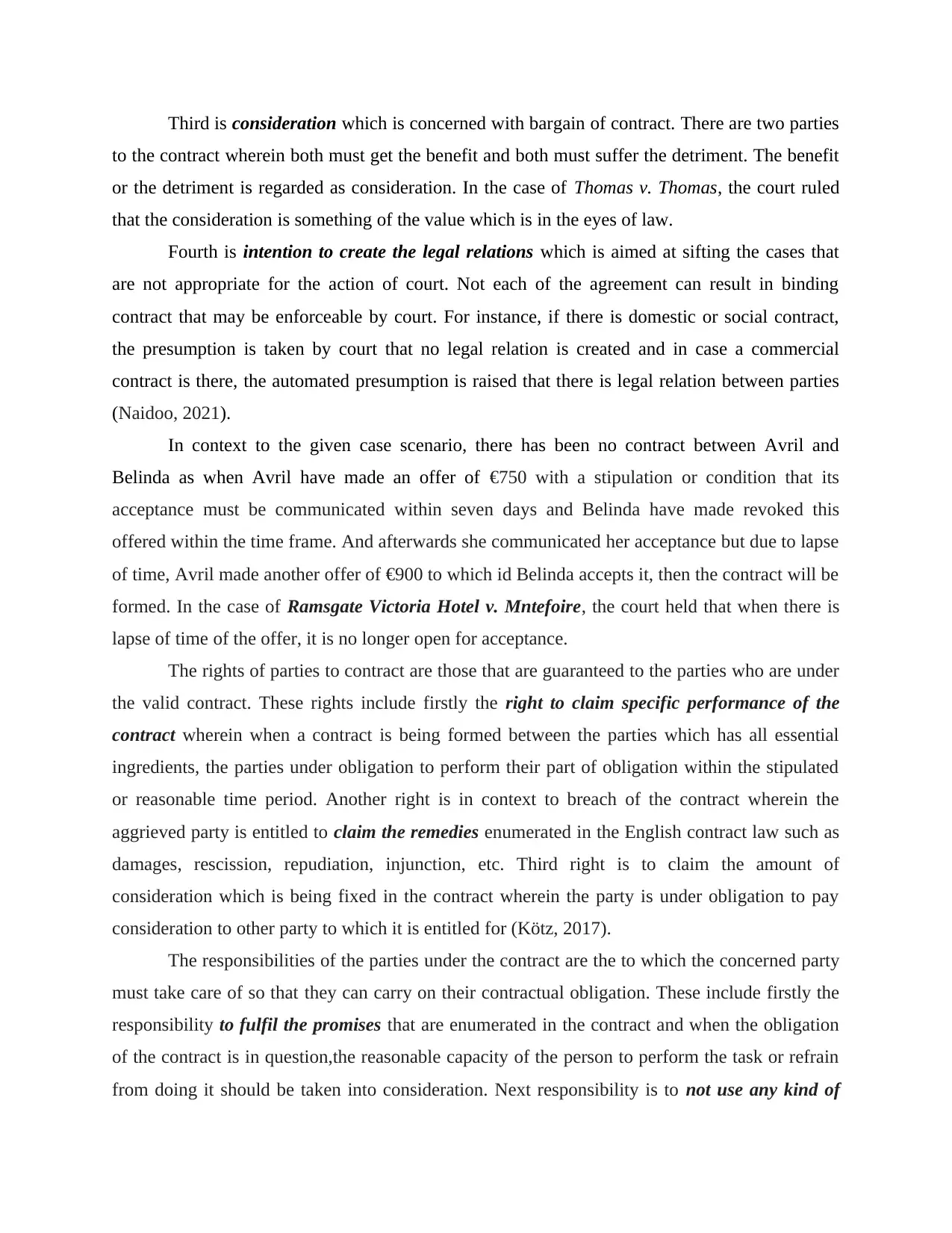
Third is consideration which is concerned with bargain of contract. There are two parties
to the contract wherein both must get the benefit and both must suffer the detriment. The benefit
or the detriment is regarded as consideration. In the case of Thomas v. Thomas, the court ruled
that the consideration is something of the value which is in the eyes of law.
Fourth is intention to create the legal relations which is aimed at sifting the cases that
are not appropriate for the action of court. Not each of the agreement can result in binding
contract that may be enforceable by court. For instance, if there is domestic or social contract,
the presumption is taken by court that no legal relation is created and in case a commercial
contract is there, the automated presumption is raised that there is legal relation between parties
(Naidoo, 2021).
In context to the given case scenario, there has been no contract between Avril and
Belinda as when Avril have made an offer of €750 with a stipulation or condition that its
acceptance must be communicated within seven days and Belinda have made revoked this
offered within the time frame. And afterwards she communicated her acceptance but due to lapse
of time, Avril made another offer of €900 to which id Belinda accepts it, then the contract will be
formed. In the case of Ramsgate Victoria Hotel v. Mntefoire, the court held that when there is
lapse of time of the offer, it is no longer open for acceptance.
The rights of parties to contract are those that are guaranteed to the parties who are under
the valid contract. These rights include firstly the right to claim specific performance of the
contract wherein when a contract is being formed between the parties which has all essential
ingredients, the parties under obligation to perform their part of obligation within the stipulated
or reasonable time period. Another right is in context to breach of the contract wherein the
aggrieved party is entitled to claim the remedies enumerated in the English contract law such as
damages, rescission, repudiation, injunction, etc. Third right is to claim the amount of
consideration which is being fixed in the contract wherein the party is under obligation to pay
consideration to other party to which it is entitled for (Kötz, 2017).
The responsibilities of the parties under the contract are the to which the concerned party
must take care of so that they can carry on their contractual obligation. These include firstly the
responsibility to fulfil the promises that are enumerated in the contract and when the obligation
of the contract is in question,the reasonable capacity of the person to perform the task or refrain
from doing it should be taken into consideration. Next responsibility is to not use any kind of
to the contract wherein both must get the benefit and both must suffer the detriment. The benefit
or the detriment is regarded as consideration. In the case of Thomas v. Thomas, the court ruled
that the consideration is something of the value which is in the eyes of law.
Fourth is intention to create the legal relations which is aimed at sifting the cases that
are not appropriate for the action of court. Not each of the agreement can result in binding
contract that may be enforceable by court. For instance, if there is domestic or social contract,
the presumption is taken by court that no legal relation is created and in case a commercial
contract is there, the automated presumption is raised that there is legal relation between parties
(Naidoo, 2021).
In context to the given case scenario, there has been no contract between Avril and
Belinda as when Avril have made an offer of €750 with a stipulation or condition that its
acceptance must be communicated within seven days and Belinda have made revoked this
offered within the time frame. And afterwards she communicated her acceptance but due to lapse
of time, Avril made another offer of €900 to which id Belinda accepts it, then the contract will be
formed. In the case of Ramsgate Victoria Hotel v. Mntefoire, the court held that when there is
lapse of time of the offer, it is no longer open for acceptance.
The rights of parties to contract are those that are guaranteed to the parties who are under
the valid contract. These rights include firstly the right to claim specific performance of the
contract wherein when a contract is being formed between the parties which has all essential
ingredients, the parties under obligation to perform their part of obligation within the stipulated
or reasonable time period. Another right is in context to breach of the contract wherein the
aggrieved party is entitled to claim the remedies enumerated in the English contract law such as
damages, rescission, repudiation, injunction, etc. Third right is to claim the amount of
consideration which is being fixed in the contract wherein the party is under obligation to pay
consideration to other party to which it is entitled for (Kötz, 2017).
The responsibilities of the parties under the contract are the to which the concerned party
must take care of so that they can carry on their contractual obligation. These include firstly the
responsibility to fulfil the promises that are enumerated in the contract and when the obligation
of the contract is in question,the reasonable capacity of the person to perform the task or refrain
from doing it should be taken into consideration. Next responsibility is to not use any kind of
Paraphrase This Document
Need a fresh take? Get an instant paraphrase of this document with our AI Paraphraser
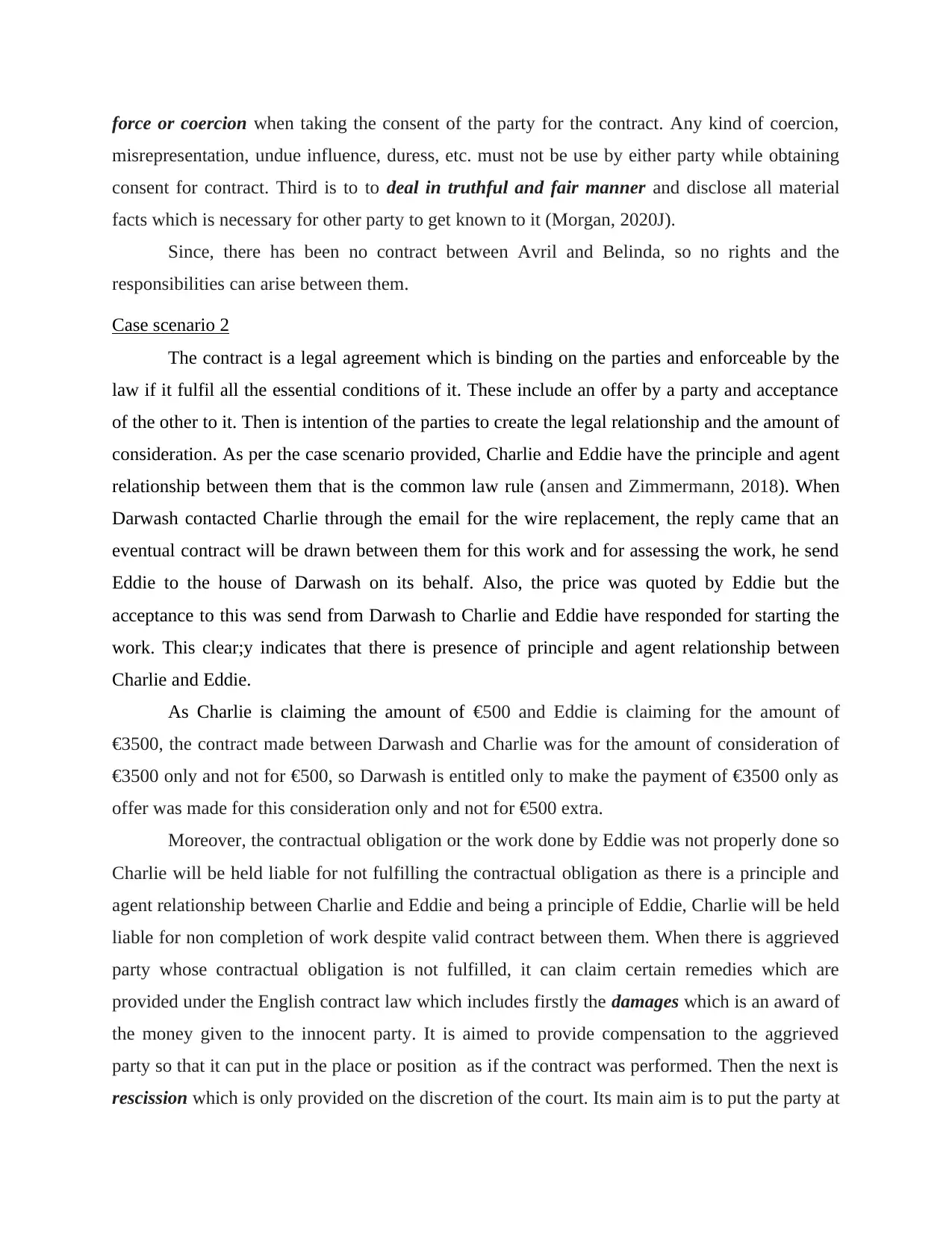
force or coercion when taking the consent of the party for the contract. Any kind of coercion,
misrepresentation, undue influence, duress, etc. must not be use by either party while obtaining
consent for contract. Third is to to deal in truthful and fair manner and disclose all material
facts which is necessary for other party to get known to it (Morgan, 2020J).
Since, there has been no contract between Avril and Belinda, so no rights and the
responsibilities can arise between them.
Case scenario 2
The contract is a legal agreement which is binding on the parties and enforceable by the
law if it fulfil all the essential conditions of it. These include an offer by a party and acceptance
of the other to it. Then is intention of the parties to create the legal relationship and the amount of
consideration. As per the case scenario provided, Charlie and Eddie have the principle and agent
relationship between them that is the common law rule (ansen and Zimmermann, 2018). When
Darwash contacted Charlie through the email for the wire replacement, the reply came that an
eventual contract will be drawn between them for this work and for assessing the work, he send
Eddie to the house of Darwash on its behalf. Also, the price was quoted by Eddie but the
acceptance to this was send from Darwash to Charlie and Eddie have responded for starting the
work. This clear;y indicates that there is presence of principle and agent relationship between
Charlie and Eddie.
As Charlie is claiming the amount of €500 and Eddie is claiming for the amount of
€3500, the contract made between Darwash and Charlie was for the amount of consideration of
€3500 only and not for €500, so Darwash is entitled only to make the payment of €3500 only as
offer was made for this consideration only and not for €500 extra.
Moreover, the contractual obligation or the work done by Eddie was not properly done so
Charlie will be held liable for not fulfilling the contractual obligation as there is a principle and
agent relationship between Charlie and Eddie and being a principle of Eddie, Charlie will be held
liable for non completion of work despite valid contract between them. When there is aggrieved
party whose contractual obligation is not fulfilled, it can claim certain remedies which are
provided under the English contract law which includes firstly the damages which is an award of
the money given to the innocent party. It is aimed to provide compensation to the aggrieved
party so that it can put in the place or position as if the contract was performed. Then the next is
rescission which is only provided on the discretion of the court. Its main aim is to put the party at
misrepresentation, undue influence, duress, etc. must not be use by either party while obtaining
consent for contract. Third is to to deal in truthful and fair manner and disclose all material
facts which is necessary for other party to get known to it (Morgan, 2020J).
Since, there has been no contract between Avril and Belinda, so no rights and the
responsibilities can arise between them.
Case scenario 2
The contract is a legal agreement which is binding on the parties and enforceable by the
law if it fulfil all the essential conditions of it. These include an offer by a party and acceptance
of the other to it. Then is intention of the parties to create the legal relationship and the amount of
consideration. As per the case scenario provided, Charlie and Eddie have the principle and agent
relationship between them that is the common law rule (ansen and Zimmermann, 2018). When
Darwash contacted Charlie through the email for the wire replacement, the reply came that an
eventual contract will be drawn between them for this work and for assessing the work, he send
Eddie to the house of Darwash on its behalf. Also, the price was quoted by Eddie but the
acceptance to this was send from Darwash to Charlie and Eddie have responded for starting the
work. This clear;y indicates that there is presence of principle and agent relationship between
Charlie and Eddie.
As Charlie is claiming the amount of €500 and Eddie is claiming for the amount of
€3500, the contract made between Darwash and Charlie was for the amount of consideration of
€3500 only and not for €500, so Darwash is entitled only to make the payment of €3500 only as
offer was made for this consideration only and not for €500 extra.
Moreover, the contractual obligation or the work done by Eddie was not properly done so
Charlie will be held liable for not fulfilling the contractual obligation as there is a principle and
agent relationship between Charlie and Eddie and being a principle of Eddie, Charlie will be held
liable for non completion of work despite valid contract between them. When there is aggrieved
party whose contractual obligation is not fulfilled, it can claim certain remedies which are
provided under the English contract law which includes firstly the damages which is an award of
the money given to the innocent party. It is aimed to provide compensation to the aggrieved
party so that it can put in the place or position as if the contract was performed. Then the next is
rescission which is only provided on the discretion of the court. Its main aim is to put the party at
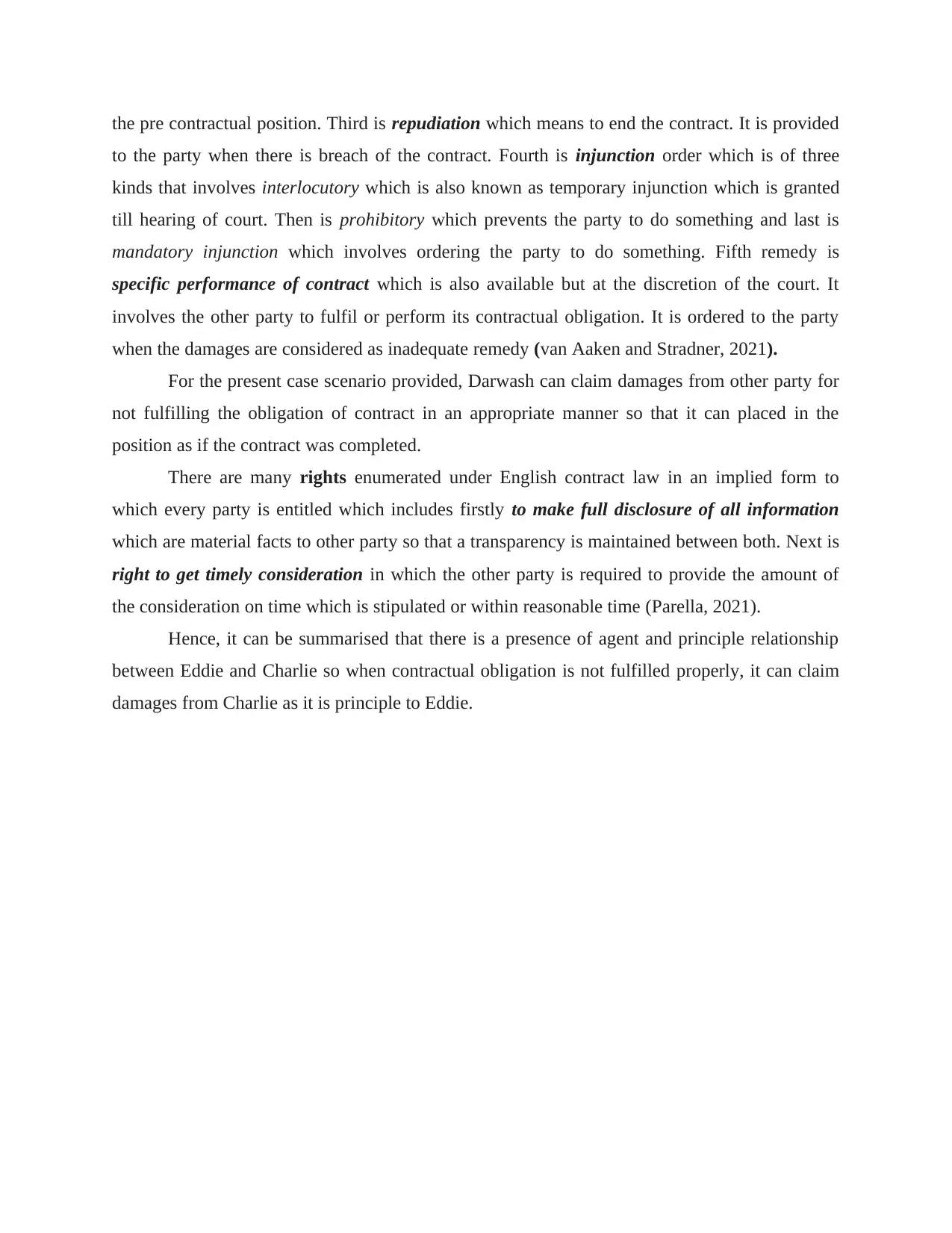
the pre contractual position. Third is repudiation which means to end the contract. It is provided
to the party when there is breach of the contract. Fourth is injunction order which is of three
kinds that involves interlocutory which is also known as temporary injunction which is granted
till hearing of court. Then is prohibitory which prevents the party to do something and last is
mandatory injunction which involves ordering the party to do something. Fifth remedy is
specific performance of contract which is also available but at the discretion of the court. It
involves the other party to fulfil or perform its contractual obligation. It is ordered to the party
when the damages are considered as inadequate remedy (van Aaken and Stradner, 2021).
For the present case scenario provided, Darwash can claim damages from other party for
not fulfilling the obligation of contract in an appropriate manner so that it can placed in the
position as if the contract was completed.
There are many rights enumerated under English contract law in an implied form to
which every party is entitled which includes firstly to make full disclosure of all information
which are material facts to other party so that a transparency is maintained between both. Next is
right to get timely consideration in which the other party is required to provide the amount of
the consideration on time which is stipulated or within reasonable time (Parella, 2021).
Hence, it can be summarised that there is a presence of agent and principle relationship
between Eddie and Charlie so when contractual obligation is not fulfilled properly, it can claim
damages from Charlie as it is principle to Eddie.
to the party when there is breach of the contract. Fourth is injunction order which is of three
kinds that involves interlocutory which is also known as temporary injunction which is granted
till hearing of court. Then is prohibitory which prevents the party to do something and last is
mandatory injunction which involves ordering the party to do something. Fifth remedy is
specific performance of contract which is also available but at the discretion of the court. It
involves the other party to fulfil or perform its contractual obligation. It is ordered to the party
when the damages are considered as inadequate remedy (van Aaken and Stradner, 2021).
For the present case scenario provided, Darwash can claim damages from other party for
not fulfilling the obligation of contract in an appropriate manner so that it can placed in the
position as if the contract was completed.
There are many rights enumerated under English contract law in an implied form to
which every party is entitled which includes firstly to make full disclosure of all information
which are material facts to other party so that a transparency is maintained between both. Next is
right to get timely consideration in which the other party is required to provide the amount of
the consideration on time which is stipulated or within reasonable time (Parella, 2021).
Hence, it can be summarised that there is a presence of agent and principle relationship
between Eddie and Charlie so when contractual obligation is not fulfilled properly, it can claim
damages from Charlie as it is principle to Eddie.
⊘ This is a preview!⊘
Do you want full access?
Subscribe today to unlock all pages.

Trusted by 1+ million students worldwide
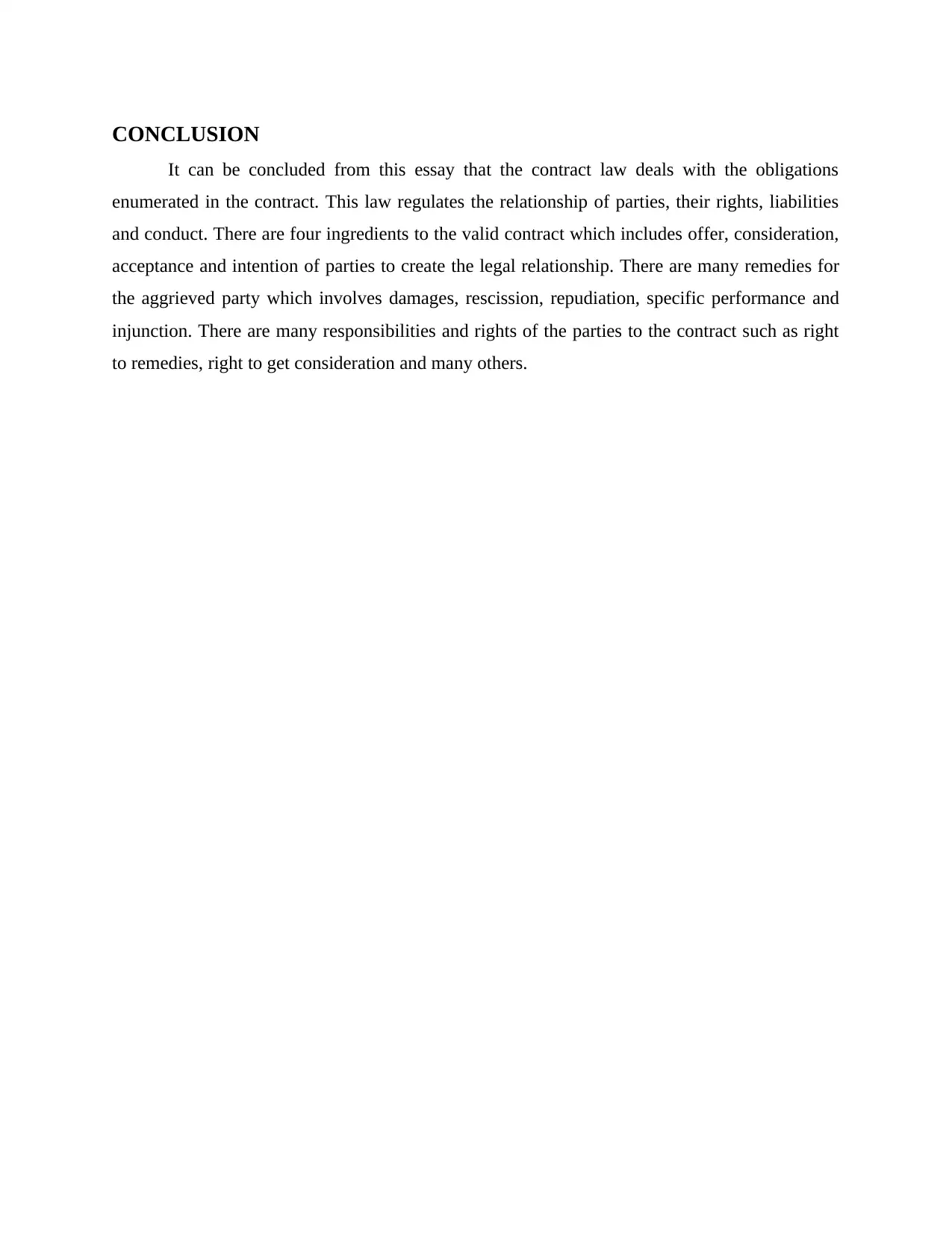
CONCLUSION
It can be concluded from this essay that the contract law deals with the obligations
enumerated in the contract. This law regulates the relationship of parties, their rights, liabilities
and conduct. There are four ingredients to the valid contract which includes offer, consideration,
acceptance and intention of parties to create the legal relationship. There are many remedies for
the aggrieved party which involves damages, rescission, repudiation, specific performance and
injunction. There are many responsibilities and rights of the parties to the contract such as right
to remedies, right to get consideration and many others.
It can be concluded from this essay that the contract law deals with the obligations
enumerated in the contract. This law regulates the relationship of parties, their rights, liabilities
and conduct. There are four ingredients to the valid contract which includes offer, consideration,
acceptance and intention of parties to create the legal relationship. There are many remedies for
the aggrieved party which involves damages, rescission, repudiation, specific performance and
injunction. There are many responsibilities and rights of the parties to the contract such as right
to remedies, right to get consideration and many others.
Paraphrase This Document
Need a fresh take? Get an instant paraphrase of this document with our AI Paraphraser
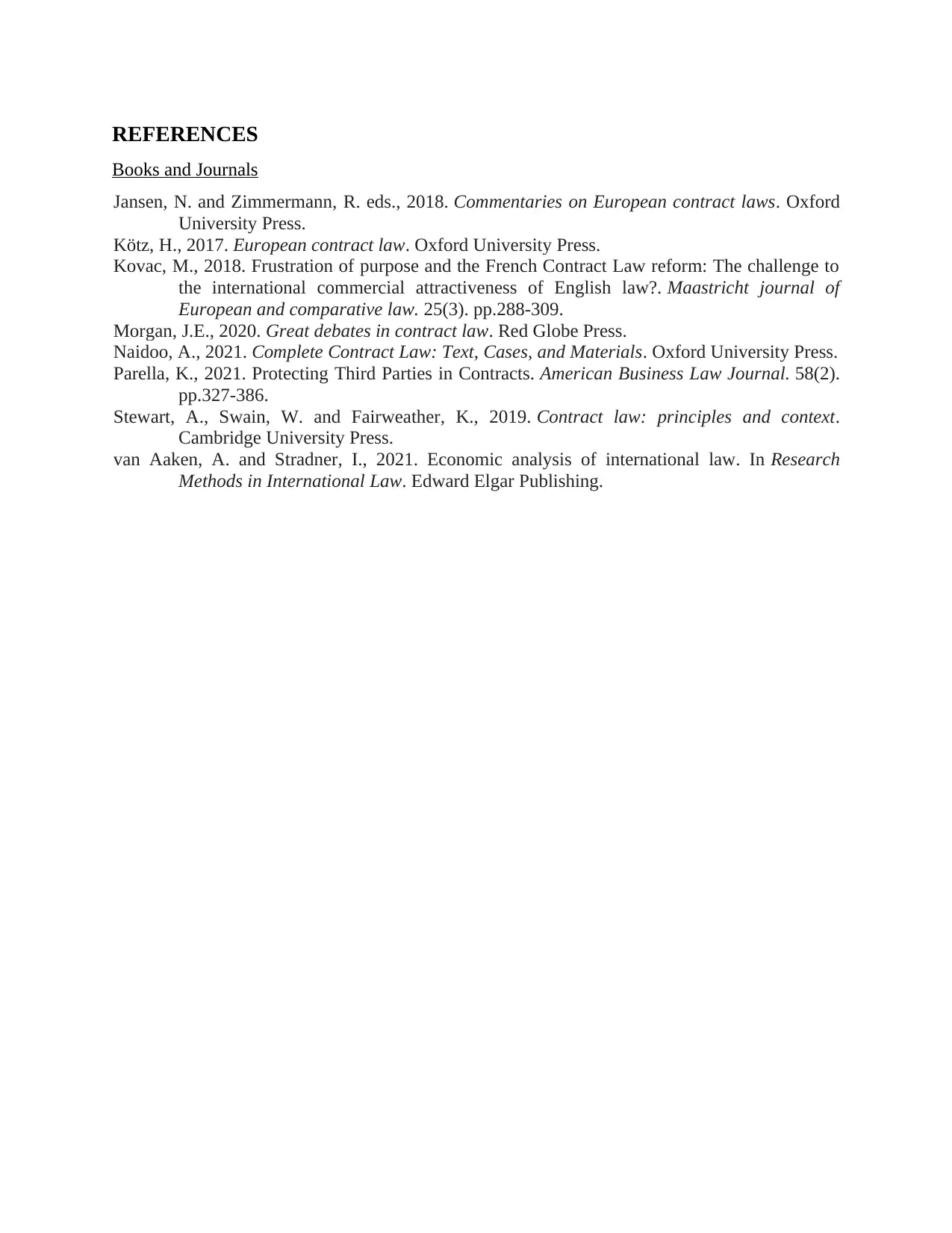
REFERENCES
Books and Journals
Jansen, N. and Zimmermann, R. eds., 2018. Commentaries on European contract laws. Oxford
University Press.
Kötz, H., 2017. European contract law. Oxford University Press.
Kovac, M., 2018. Frustration of purpose and the French Contract Law reform: The challenge to
the international commercial attractiveness of English law?. Maastricht journal of
European and comparative law. 25(3). pp.288-309.
Morgan, J.E., 2020. Great debates in contract law. Red Globe Press.
Naidoo, A., 2021. Complete Contract Law: Text, Cases, and Materials. Oxford University Press.
Parella, K., 2021. Protecting Third Parties in Contracts. American Business Law Journal. 58(2).
pp.327-386.
Stewart, A., Swain, W. and Fairweather, K., 2019. Contract law: principles and context.
Cambridge University Press.
van Aaken, A. and Stradner, I., 2021. Economic analysis of international law. In Research
Methods in International Law. Edward Elgar Publishing.
Books and Journals
Jansen, N. and Zimmermann, R. eds., 2018. Commentaries on European contract laws. Oxford
University Press.
Kötz, H., 2017. European contract law. Oxford University Press.
Kovac, M., 2018. Frustration of purpose and the French Contract Law reform: The challenge to
the international commercial attractiveness of English law?. Maastricht journal of
European and comparative law. 25(3). pp.288-309.
Morgan, J.E., 2020. Great debates in contract law. Red Globe Press.
Naidoo, A., 2021. Complete Contract Law: Text, Cases, and Materials. Oxford University Press.
Parella, K., 2021. Protecting Third Parties in Contracts. American Business Law Journal. 58(2).
pp.327-386.
Stewart, A., Swain, W. and Fairweather, K., 2019. Contract law: principles and context.
Cambridge University Press.
van Aaken, A. and Stradner, I., 2021. Economic analysis of international law. In Research
Methods in International Law. Edward Elgar Publishing.
1 out of 8
Related Documents
Your All-in-One AI-Powered Toolkit for Academic Success.
+13062052269
info@desklib.com
Available 24*7 on WhatsApp / Email
![[object Object]](/_next/static/media/star-bottom.7253800d.svg)
Unlock your academic potential
Copyright © 2020–2026 A2Z Services. All Rights Reserved. Developed and managed by ZUCOL.





